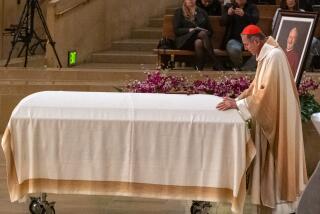Trial Focuses on Defendant’s Role in Suicide : Courts: Prosecutors say Alex Coventry aided in the death. Counsel argues his client never thought the man would kill himself.
- Share via
VAN NUYS — Alex Coventry assembled a shotgun, loaded a shell into the chamber and handed the weapon to his despondent roommate, encouraging him to follow through on his often-repeated threat to commit suicide, according to prosecutors.
Leonard Medina, who had been drinking most of that day last summer, leveled the gun at his chest and pulled the trigger, his organs shredding as the buckshot passed through his body.
A jury seated Tuesday in Van Nuys Superior Court will be asked to determine if Coventry’s actions violated a rarely used, 120-year-old law that makes it a felony for “any person who deliberately aids, advises or encourages” someone to commit suicide.
Although prosecutors say Coventry’s actions were clearly illegal, the defense maintains that Coventry never believed Medina would go through with the suicide.
If convicted, Coventry faces up to three years in state prison. He is free on his own recognizance. Attorneys will make opening statements Thursday to the jury.
On July 2, 1993, Medina, who had been drinking for eight hours, shot himself in the darkened bedroom of Coventry’s Tujunga apartment while the defendant and his girlfriend were present.
According to investigators, Coventry handed the weapon to Medina, who was despondent over financial problems, and told him: “Stop talking about it. Just do it.”
On the surface, the case may have shades of that of retired Michigan pathologist Jack Kevorkian, who has gained international attention by helping 20 terminally ill people commit suicide with a machine he designed.
But attorneys on both sides of the case caution that Medina’s case differs from Kevorkian’s principally because Medina’s suicide did not seem to be well-planned and there was no evidence he was terminally ill.
Unlike the people who died under Kevorkian’s guidance, Medina’s suicide “is something that develops in an hour over cocktails,” Deputy Dist. Atty. Andrew R. Flier said. Coventry has no medical training and Medina’s use of a firearm threatened other people, Flier said, unlike Kevorkian’s machine.
Flier believes Coventry took two important actions that directly linked him to the suicide: handing Medina the gun and then telling him “to put up or shut up.”
There is some indication Medina was suffering emotionally. Testifying at a preliminary hearing in October, Coventry’s girlfriend, Linda McDowell, said Medina told her just after he shot himself: “ ‘Linda, don’t worry about it. Everything’s OK now.’ ”
But defense attorney Kenneth Lezin stressed that the law under which Coventry is being prosecuted says a person must deliberately assist the person committing suicide, which he maintains was not the case with Coventry.
The word deliberately “makes all the difference in the world,” Lezin said.
“At no time did (Coventry) ever intend or plan or believe Leonard was going to kill himself,” he said.
More to Read
Sign up for Essential California
The most important California stories and recommendations in your inbox every morning.
You may occasionally receive promotional content from the Los Angeles Times.













